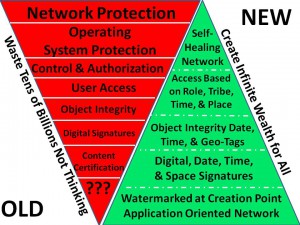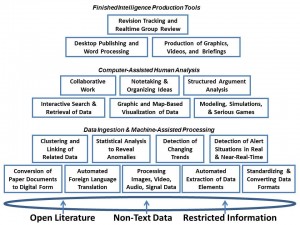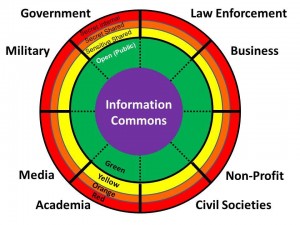
US Government: Computer Infrastructure
Notice that the US Federal government spent $0.68 cents of every IT dollar on operations and maintenance in 2010. Jump to the 2017 estimate. Notice that the status quo is likely to consume $0.77 cents of every IT dollar.
Bam! Pow! Zap! Palantir Steps Up Fight with US Army
I recall one Master of the Universe telling me, “Keep the client happy.” Today an alternative approach has emerged [and is being pioneered by Palantir]. I term it “Fight with the client.” I assume the tactic works really well.

Phi Beta Iota: The US Government has resisted, since 1986, all recommendations with respect to modernizing its information technology. In 1994 it explicitly refused a recommendation that it spend $1 billion a year on cyber-education, cyber-security, and cyber-standards. As one wag noted in the 1990's, we have 1950's mind-sets in charge of 1970's technology and without a clue as to the 21st Century possibilities. The Army's DCGS problem starting in the 1980's. Palantir is not part of the answer. They cheated IBM with industrial espionage (this has been established in court with a very large judgment against them), and their offering is grotesquely expensive at the same time that its developers are pimply children with no idea what a real world analyst needs. Palantir is, in our view, a scam. The US Army is completely correct to find them unworthy. IBM/i2 are not very good and DCGS is a Stone Age construct that is totally unsuited for sharing information and making sense of information when the bulk of that information is outside the wire with “uncleared” indigenous personnel who cannot afford and would never be approved for access to DCGS or any C4I system remotely associated with the US military.

What the US Army needs is a clean-sheet reboot that is centered on knowledgeable human analysts and what they need to do their job, augmented — not replaced by computers that leverage Open Source Everything Engineering (OSEE) — integrating open source software, open source hardware, open cloud, open spectrum, and more, defaulting to Open Source Intelligence (OSINT) as the common information environment. In that kind of environment, none of the legacy companies (IBM, Microsoft), none of the new rich (Google, Facebook), and none of the Silicon Valley financially-drive customer-hostile “start-ups” will be competitive. Alternative C4I is rooted in Open Everything. This is not a concept Palantir can afford — they rely on secrecy and law suits (and sealed files) to carry on with their misrepresentation that is in contempt of the government and the public interest.
Side Note: Palantir has just been charged by the Department of Labor with discriminating against Asians.As quote for the article:
If Palantir doesn’t end the practice, the OFCCP will request the cancellation of the company’s contracts, as well as bar it from getting federal contracts in the future.
If Palantir continues its unethical and annoying endeavors, they should expect to be a target for more serious attention with a closer focus on their continued penchant for industrial espionage against competitors, and financial misrepresentation to their investors. Palantir is not Goldman Sachs and Duncan Hunter is not John McCain — in our view, Palantir just made the jump from pathetic to toxic.

See Especially:
Steele, Robert. “Memorandum for the Vice President, “SUBJECT: Supporting the President’s Interest in 2015 Defense, Diplomacy, and Development Innovation – the Open Source (Technologies) Agency, Digital Deserts, & Global Stabilization,” Oakton, VA: Earth Intelligence Network, October 8, 2015.
Steele, Robert. “Foreword,” in Stephen E. Arnold, CyberOSINT: Next Generation Information Access, Harrods Creek, KY: Arnold Information Technology, 2015.
Steele, Robert. “Data Mining: Don’t Buy or Build Your Shovel Until You Know What You’re Digging Into,” Washington, DC: National Research Council, October 25, 1994, to the working group reviewing the US Army’s multi-billion-dollar future communications architecture.
Steele, Robert with James Anderson, William Caelli, and Winn Schwartau, “Correspondence, Sounding the Alarm on Cyber Security,” McLean, VA: Open Source Solutions, Inc., August 23, 1994.
See Also:



